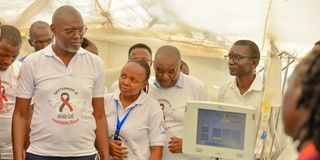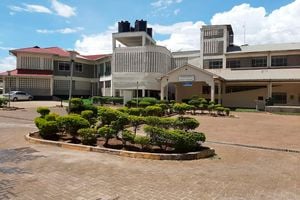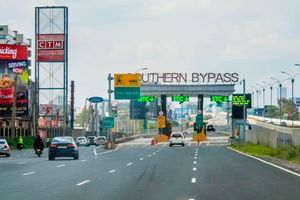Doctors go for specialist training in India

Kisumu Health Executive Gregory Ganda (left) during a sickle cell awareness campaign at Jaramogi Oginga Odinga Teaching and Referral Hospital. He says the bone marrow transplant centre at the facility will be operational in 14 months' time.
What you need to know:
- According to the 2015-2020 report on Medical Tourism by the Ministry of Health, about 97 per cent of Kenyan patients who seek medical treatment outside the country have been travelling to India.
- The report further states that 36 per cent of the patients who travelled to India were seeking cancer treatment.
Preparations to set up a bone marrow transplant (BMT) unit in Kisumu are in top gear, with the county revealing plans to send a team of doctors to India for specialist training.
Health Executive Gregory Ganda said the BMT centre will be operational in 14 months’ time.
The facility will be housed in Victoria Annex Hospital, which has been operating as an annex of Jaramogi Oginga Odinga Teaching and Referral Hospital (JOOTRH).
According to Dr Ganda, the doctors who are attached to JOOTRH will attend a six-month training in India on the medical procedures ahead of the official launch of the transplant centre next year.
“We have already sent the first doctor for training in New Delhi, and the other one will be travelling in March next year for a similar course,” said Dr Ganda.
The BMT unit, which will be the first public health centre in Africa to offer such services, will be a relief to Sickle Cell Disease (SCD) and Haemophilia patients who often spend millions of shillings while travelling to India and to other countries in search of the services.
The initiative to put up the facility comes a couple of months after Nairobi West Hospital performed the first BMT on a patient who was suffering from multiple myeloma, a type of blood cancer, last year.
The procedure was done by a team of experts led by a specialist from the New Delhi Cancer Centre.
Bone marrow transplant has been successfully used in treating acute myeloid leukaemia, multiple sclerosis, paediatric immunodeficiencies and acute lymphocytic leukaemia.
Dr Ganda said once complete, the facility will help reduce the number of cancer patients who travel out of the country in search of medical services.
According to the 2015-2020 report on Medical Tourism by the Ministry of Health, about 97 per cent of Kenyan patients who seek medical treatment outside the country have been travelling to India. The report further states that 36 per cent of the patients who travelled to India were seeking cancer treatment. “The hospital will not only receive BMT patients from Kenya but across Africa, especially SCD warriors from Nigeria who have been travelling to India for similar procedures,” said Dr Ganda.
The two doctors will lead a team of 25 experts who will be in charge of the facility.
To make the health services more efficient, the county is planning to put up hostels to host the patients who will be spending months in the facility during recovery.
The partnership will also see doctors and nurses trained in bone marrow transplant and the county guided to set up a sickle cell rehabilitation centre, a mental health clinic, a newborn baby screening unit and a 25 bed ICU bone marrow transplant unit in an effort to limit mortalities.
The transplant centre is a project of the county government of Kisumu, JOOTRH and support from the Fortis Memorial Research Institute, India.
The facility aims to strengthen the management of SCD in Kisumu, one of the counties burdened by the blood disorder in Kenya.
According to the latest statistics by the Kisumu County government, 21 out of 100 children are born yearly in Kisumu with the SCD trait.
The statistics revealed that 50 to 90 per cent of the newborns die before their fifth birthday while a majority succumb to the complications of the blood disorder undiagnosed.





